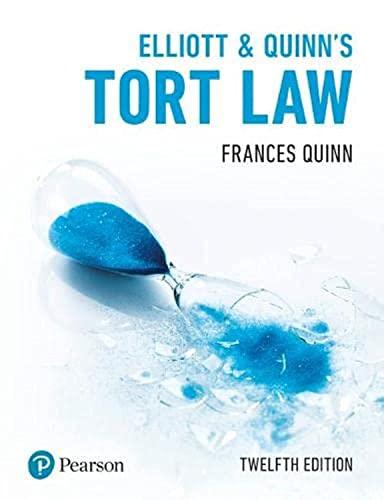Question
After winning a majority of 100 in the (fictional) February 2020 UK general election the Reactionary Party introduced the Human Rights Act (Repeal) Bill 2020
After winning a majority of 100 in the (fictional) February 2020 UK general election the Reactionary Party introduced the Human Rights Act (Repeal) Bill 2020 to fulfil its manifesto commitment to repeal the Human Rights Act 1998 and to replace it with a British Bill of Rights. The National Party for Scotland (NPS), who form a minority Scottish Government, have secured support across the Scottish Parliament chamber from the Better Environment Party and the Scottish Progressive Party to refuse legislative consent to the Bill.
In response, the responsible minister, the Home Secretary, informed the UK Cabinet that she intended to ignore the Scottish Parliament's legislative consent motion and to legislate for the whole of the UK. "A British Bill of Rights must apply equally across Britain," she told the BBC's politics reporter Adam McNeil.
Determined to defend and enhance the level of human rights protection in Scotland the Scottish Government has taken two steps:
First, the Scottish Government raised a judicial review action challenging the legality of the 2020 Bill, arguing that section 2 of the Scotland Act 2016 prevents the UK Parliament from legislating in devolved areas where legislative consent by the Scottish Parliament is refused. To the surprise of UK Government Ministers, in the Outer House of the Court of Session a famously maverick judge, Lord Callaway, held that section 2 of the Scotland Act 2016 does place a legal limit on the legislative competence of the UK Parliament. In addition, he said that where the UK Parliament legislates in devolved areas absent the legislative consent of the Scottish Parliament it offends a fundamental constitutional principle: devolution. He therefore placed an injunction on the Speaker of the UK Parliament preventing her from seeking Royal Assent for the Bill.
Second, the Scottish Government introduced the Human Rights Act (protection) (Scotland) Bill 2020 which seeks to amend the Human Rights Act 1998 by inserting a clause which requires UK Ministers to consult with the Scottish, Welsh and Northern Irish counterparts before any measure is taken to amend or repeal the Act. The Bill was passed by the Scottish Parliament but before it received Royal Assent it was referred by the Attorney General to the Supreme Court. The Attorney General has advised the UK Government that the Scottish Bill is not within the legislative competence of the Scottish Parliament and the challenge is mounted on that basis.
You are a Scottish solicitor working for the UK Government in the Government Legal Department. The Home Secretary has asked for a briefing paper on (1) the chances of overturning the Outer House decision regarding the UK Bill in the House of Lords (2) the likely outcome of the Supreme Court challenge to the competence of the Scottish Bill.
Step by Step Solution
There are 3 Steps involved in it
Step: 1

Get Instant Access to Expert-Tailored Solutions
See step-by-step solutions with expert insights and AI powered tools for academic success
Step: 2

Step: 3

Ace Your Homework with AI
Get the answers you need in no time with our AI-driven, step-by-step assistance
Get Started


